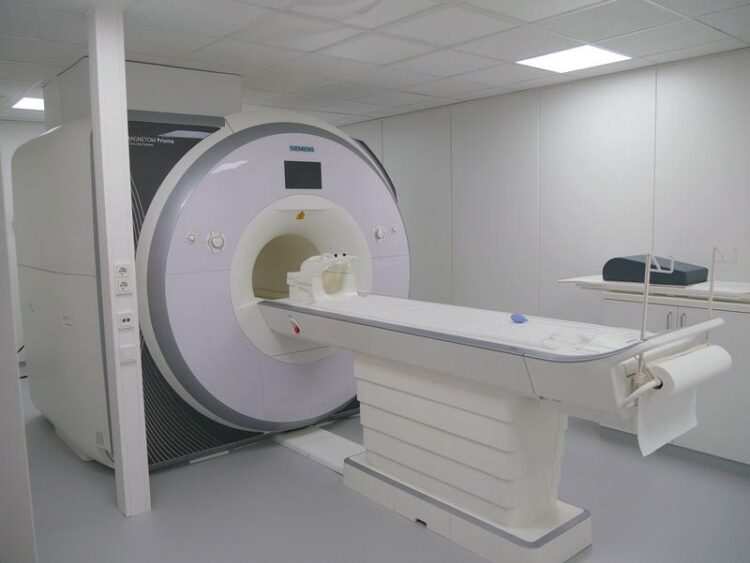IfADo expands systems biology approach with research MRI

IfADo owns the only MRI scanner in Dortmund which is exclusively dedicated to research.
Mühle/IfADo
Watching the brain at work and studying its functions – this is now possible at the Leibniz Research Centre for Working Environment and Human Factors (IfADo) by magnetic resonance imaging (MRI). The new three tesla MRI scanner will intensify interdisciplinary research at IfADo for the benefit and protection of working people.
With the MRI scanner, researchers at IfADo will comprehensively examine brain structure and functions in different contexts. For example, they will focus on how the brain changes with age and which neuronal processes are responsible for deterioration of performance. “With our MRI scanner we can not only analyse brain structures, but also record brain activity. This enables us to assess which areas of the brain are responsible for certain functions such as memory, learning ability or cognitive performance,” explains Dr. Erhan Genҫ. The neuroscientist will coordinate the new MRI unit for the IfADo department Psychology & Neurosciences.
The establishment of the MRI laboratory required investments of about three million euros, financed as part of a minor extraordinary item of expenditure of scientific-strategic nature (“Sondertatbestand”) with funds from the Ministry of Culture and Science of North Rhine-Westphalia and the Federal Ministry of Labour and Social Affairs. “Our aim is to analyse how the human system and its central organs function and interact. This requires modern analytical methods. The MRI scanner is therefore important in advancing our basic and application-oriented research,” states Prof. Dr. Michael Nitsche, scientific director and head of the research department Psychology & Neurosciences at IfADo.
From brain to liver, and beyond: intensifying collaborations
“In addition to age-related cognitive changes, we will also study work-related neurotoxic effects of chemicals in the MRI scanner. For example, we can draw on the expertise of IfADo on manganese exposure of welders or exposure to solvents. In addition, we will study the functioning of the liver, the central detoxification and metabolic organ, from a broader perspective,” summarizes Prof. Michael Nitsche. Finally, the MRI scanner offers a wide range of possibilities for strengthened regional cooperation within the framework of the University Alliance Ruhr. It is the only research MRI scanner situated in Dortmund.
Developing measures, and interventions for fostering healthy work conditions
The findings that IfADo researchers will obtain from the MRI studies in combination with other imaging techniques such as electroencephalography will form the basis for improvements of work conditions. On the one hand, the aim is to better adapt the working environment to the needs of the employees. On the other hand, the measures are aimed at improving certain personal conditions. The latter might be achieved, for example, by non-invasive brain stimulation procedures, which are already being studied at IfADo: magnetic and electrical pulses can influence the activity and excitability of the brain, leading to performance alterations. This can also be done simultaneously during MRI examinations at IfADo.
How does magnetic resonance imaging work?
An MRI scanner uses magnetic impulses to generate tomograms of the body. This means that the human body is not exposed to X-rays during an MRI session. Instead, the scanner generates a strong magnetic field. The hydrogen atoms in the body react to this field and in turn emit electromagnetic impulses. The device measures these impulses. With the help of the MRI scanner not only brain structures can be imaged, but also active and inactive brain areas can be identified (functional MRI, also fMRI).
The Leibniz Research Centre for Working Environment and Human Factors (IfADo) comprises the research areas Ergonomics, Immunology, Psychology & Neurosciences and Toxicology. The approximately 220 employees focus on the potentials and risks of modern work on a life and behavioural science basis. IfADo is a member of the Leibniz Association, which comprises 96 independent institutions. The institute is financed by joint institutional funding from the federal and state governments as well as from third-party funds.
Wissenschaftliche Ansprechpartner:
Dr. Erhan Genҫ
Head of MRI unit and junior research group Neuroimaging and Interindividual Differences at the IfADo-department Psychology & Neurosciences
Phone: +49 231 1084-520
Email: genc@ifado.de
Prof. Dr. Michael Nitsche
Director and head of the research department Psychology & Neurosciences
Phone: +49 231 1084-301 / -302
Email: nitsche@ifado.de
Weitere Informationen:
https://www.ifado.de/ifadoen/blog/2021/01/20/fmri/ IfADo Website
.be Time-lapse video of the installation
Media Contact
All latest news from the category: Health and Medicine
This subject area encompasses research and studies in the field of human medicine.
Among the wide-ranging list of topics covered here are anesthesiology, anatomy, surgery, human genetics, hygiene and environmental medicine, internal medicine, neurology, pharmacology, physiology, urology and dental medicine.
Newest articles

A new class of cosmic X-ray sources discovered
An international team of astronomers, led by researchers from the Astronomical Observatory of the University of Warsaw, have identified a new class of cosmic X-ray sources. The findings have been…

An open solution to improving research reproducibility
Academic and industry scientists collaborate on a new method to characterize research antibodies. Structural Genomics Consortium researchers at The Neuro (Montreal Neurological Institute-Hospital) of McGill University, in collaboration with scientists…

Living in the deep, dark, slow lane
Insights from the first global appraisal of microbiomes in earth’s subsurface environments. Which microbes thrive below us in darkness – in gold mines, in aquifers, in deep boreholes in the…



